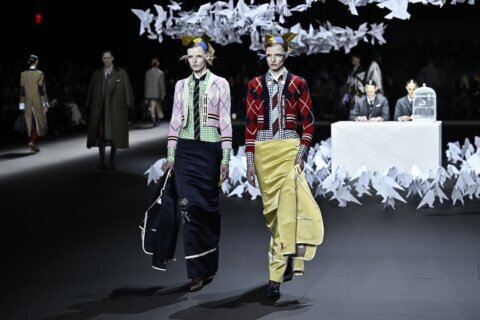PARIS (AP) — A white, sanitized runway inside Paris’ Palais de Tokyo was adorned with pleated garments on Thursday, displayed like paintings on its walls.
The spectacle hinted at the theme of Issey Miyake’s display — fusing fashion and drawings by French artist Ronan Bouroullec to find a quiet power. The collaboration at Paris Fashion Week made for an unusually poetical collection, and one unafraid of color.
Here are some highlights of the fall-winter 2024 men’s shows:
MIYAKE’S ART LESSON
Bursting onto the scene with a kaleidoscope of imagination, the Homme Plisse Issey Miyake collection was a journey through texture and color.
In this season’s offerings, the sparing use of Bouroullec’s vivid drawings on the house’s loose, pared-down iconic pleats created an understated impact. Each garment moved fluidly and with a vibrancy. The garment-canvasses brought an artistic vision into the realm of wearable art, marrying the ethereal drawings with the tangible, moving nature of clothes. In many instances, it felt like a dance of shadow and light, where the pleats seemed to bring the drawings to life, creating an illusion of movement even in stillness.
Among the myriad dreamlike moments in this inspired display were striking moments of color-blocking. One model held a voluminous vermilion red fabric abstractly in his hand, powerfully contrasting with a green arm and a black tunic. It made for a bold interplay.
Delving deeper into the heart of the collection, Bouroullec reflected on the collaboration, calling it “an extraordinary experience.”
“I discovered many things … about what my work has in common and in contrast with clothing design,” Bouroullec said.
It was not just the synergy, he said, but also the distance between the two disciplines that made this project come to life, redefining the limits of fashion as a form of artistic expression.
THE ART OF THE INVITATION, THE PARIS FASHION WEEK WAY
The fashion industry’s penchant for extravagant invitations has remained a curious relic in the digital age and an increasingly climate change-conscious world.
Each season, Paris becomes a maze of couriers delivering unique, often handcrafted invitations — a stark contrast to the industry’s growing eco-awareness narratives. Top fashion houses compete crafting invitations that offer a sneak peek into their runway themes.
Kenzo, for Nigo’s show, offered a hardback book, each page adorned with “Kenzo,” and guest details elegantly handwritten on a bookmark. Loewe sent out a 2 square meter- (21.5 foot-) cloth embellished with striking artwork and a pin holding the show information on a card.
Louis Vuitton, capturing the essence of Pharrell’s Americana-inspired show, chose a more musical theme, delivering invitations in the form of a box containing a metal harmonica.
However, as the industry moves toward more sustainable practices, the art of the invitation is likely to evolve, balancing creative expression with environmental responsibility.
VAN NOTEN’S RUNWAY REBELLION
Dries Van Noten, the master of contradictions, opened his latest show with a striking twist on the classic suit jacket – tailored to drape like a coat yet unexpectedly capped with truncated woolen arms. The piece set the tone for a collection marked by truncation, contrasting textures, and fluid silhouettes. Off-kilter designs manifested in dark, brooding hues as one standout shirt, adorned with preppy buttons, revealed a glossy black leather undergarment beneath. Theatricality was further embraced in ruffled black gloves, complementing the ruched, Shakespearean looseness of a billowing blue top.
The Belgian designer’s collection, infused with his signature blend of historical motifs and modern subcultures, explored the evolving narrative of contemporary masculinity. His knack for juxtaposing structural sharpness with soft fluidity shone in coats that married tailoring with flowing lines, crafted in rich, tactile materials.
Boldness is a Van Noten staple, and this collection was no exception. Vivid splashes of color punctuated the otherwise subdued palette, while striking patterns added a layer of visual depth. Models traversed the runway, each embodying orchestrated disarray — a testament to Van Noten’s ability to mix seemingly disparate elements into compelling ensembles.
In a fashion landscape often torn between tradition and innovation, Van Noten’s unique path remains clear – challenging norms with reverence to the craft.
LEMAIRE’S LAYERED LUXURY AND FOLKSY FUSION
In the historic enclave of Le Marais, Lemaire’s show was a symphony of style and cultural storytelling, set in its new headquarters. Christophe Lemaire and Sarah-Linh Tran unveiled a masterclass in layering, blending balletic grace with folk-inspired flair.
On a circular stage, models clad in voluptuously tailored layers sashayed, their every turn echoing intimate connection with the clothes.
The garments themselves spoke volumes — from dark shirts with intricate embroidered collars to sheer overskirts paired with stirrup leggings and block heels, hinting at a blend of Western and Eastern European influences.
Lemaire’s expertise in soft tailoring was evident in every piece. Mannish suit jackets, loose pants with hand-rolled cuffs, and a rich array of outerwear, including aviator shearlings and raincoats, evoked a relaxed sophistication. The color palette was a cozy embrace of lichen, clotted cream, and burnt-toast browns.
The show’s intimate setting allowed guests a close-up view of the meticulous craftsmanship, from hand-drawn thistle prints to the delicate interplay of ballet and sleepwear elements.
The accessories were a nod to the brand’s folkloric theme, with abstract bolo ties and small silvery bells adorning bags. Lemaire did not just present clothes — they invited the audience into a world where fashion is a narrative woven with cultural threads.
Copyright © 2025 The Associated Press. All rights reserved. This material may not be published, broadcast, written or redistributed.













